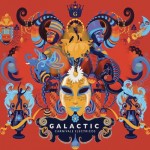On Carnivale Electricos, Galactic delivers exactly what the title promises. The funk band turns its attention to Carnival music, and electricity is central to every track. Carnival in New Orleans, Rio and Cajun Country may rely on acoustic instruments, but like From the Corner to the Block and Ya-Ka-May, Carnivale Electricos is the product of the studio, where even Ben Ellman’s sax and Stanton Moore’s drums are looped and/or manipulated. The results sound contemporary without disappearing into techno’s bleeped and blipped future.
As on Ya-Ka-May, texture is everything this time around, and no instrument is sacrosanct, not even voices. The Revivalists’ David Shaw and Big Chief Juan Pardo sound like they’re singing through megaphones on “Hey Na Na” and “Ha Di Ka” respectively. Jeff Raines’ guitar crunches with plenty of distortion, and there’s a never-ending chatter of percussion, whether it’s handclaps, shakers, Casa Samba’s drums or hyperactive cowbells. Like dub, parts enter and exit the mix, but not in trippy ways. Instead, they change the texture of the song, momentarily isolating the heart of the groove before creating a surge as other instruments rejoin the mix.
The spirit of Carnivale Electricos is inclusive, starting with the Carnivals it refers to, but also in the choices of collaborators. Galactic reaches across generations and genres to include Al “Carnival Time” Johnson, who’s on hand to sing on a radical remake of his namesake song, along with Mystikal, Cyril and Ivan Neville, Moyseis Marques, Mannie Fresh and more. Musically, the album addresses Carnival’s many facets, whether it’s the joy of running the streets with friends, the blare of marching bands, or the woozy morning after of Ash Wednesday.
There are those who prefer the way Galactic’s grooves breathe live to their recent studio efforts. I understand the preference, but when the band treats Carnival/Carnivale music the way it does, it passes the crackle of electricity to the celebrations as well, making ages-old, tradition-bound ceremonies seem utterly modern—even post-modern—as well.





